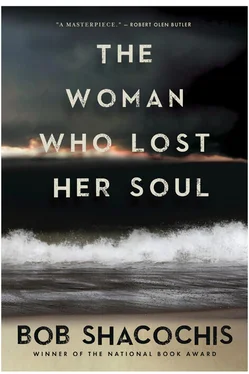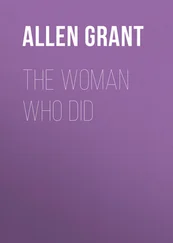He went back to his car and the water hadn’t come up any more but it started raining again, not heavy this time but steady and unpleasantly cold, and as he looked across the new gorge of the flooded intersection at the line of cars on the other side, four cars up he saw a cracking sprinkle of lights, like flashbulbs popping out little tongues of hot color, then a huge boom detonated off over the harbor and the sky was illuminated just long enough for him to see a guy move from the fourth car up to the third car up and then it was black again and then he saw another pop of yellow-red lights and then the form of this man moving to the next car and bzzrt, he had a machine pistol or an Uzi and was going from car to car spraying people as they sat cowering from the storm and Tom thought, Shit, there’s only one car left and the water’s going down and what’s he going to do, wade across and keep going down the line? but when the killer walked up to the driver’s window of the last car and bent over to look in, a blue-edged cone of white light took his head right off. Finally, cars behind Tom were backing up, their tires spinning on the wet tar, and he got his own car turned around and got out of there, going the opposite direction from where he wanted to be, and he wasn’t thinking clearly because he thought he’d go to the airport and get a plane out in the morning but of course there weren’t any flights because the airport had been closed for months and he thought, Okay, I’ll still go to the airport because the 10th Mountain Division is there, thinking they can do something, they can help, so he drove up to the main gate into a sudden blinding sun of kleig lights and voices yelling at him to get the fuck out of his vehicle and lie on the ground and he’s lying in the mud screaming, I’m an American for God’s sake, and they shout back, Are you in trouble?
Not me, Tom tried to explain, but there’s people—
The soldiers he can’t see behind the lights shout back, Then get the fuck out of here, man. What’s wrong with you, you crazy asshole?
So he got up out of the mud and gave the finger to the 10th Mountain Division and drove across the road to the LIC, which was still abandoned and full of squatters and refugees and he parked next to the night watchman’s kiosk and crawled into the backseat and smoked a pack of cigarettes and then pretended to himself, I’m sleeping . The sky began to turn light and Tom wanted a shower and his bed back at the Oloffson and he wanted a drink, he wanted ten drinks, so he got behind the wheel and went back the way he was trying to go the night before and the road was empty. The intersection was ripped up, a gouge in the earth stinking strongly of death and sewage, the cross streets above it and below it torn apart, houses sheared in half, awful-smelling red mud and soggy household trash everywhere but no cars, nothing, empty. Nobody and nothing on the road but Tom. Nothing in Haiti ever gets cleaned up, so what was he supposed to think? He climbed down into the debris-strewn channel of the intersection and followed the raging path of the water down to the sea, where he stood staring at the unspeakably contaminated shallows. Nothing. He couldn’t go to the police — the police had been disbanded — and the American military was too obsessed with protecting itself from God knows what to be bothered. For days he queried everybody he thought might know something, he knocked on doors of the houses that had survived the deluge, he went to the Haitian radio stations, but no one had heard of a car being washed away or a gunman going from car to car assassinating people and then getting shot himself and Tom thought, What am I supposed to do with this? And it dawned on him, if he wrote it into a report, it happened; otherwise, it never happened.
So what’d you do? asked Dolan.
I haven’t really thought about it, he said, until that cop brought his fist down on the hood, and Dolan told him, You know, Tom, you can’t go bearing witness to every fucking terrible thing.
In the final days of the occupation the photographers owned the veranda at the Hotel Oloffson. From midmorning until lunch you’d find them here in their bulging vests stirring coffee and passing around a pack of cigarettes, their cameras in pieces on the tables, a glossy-black clutter of expensive metals and indestructible alloys, canisters of film scattered about like unchambered rounds of ammunition, telescopic lenses like mortar tubes, their vernacular as esoteric as the military’s, distilled with acronyms, equipment referenced by numbers alone. But most of the time, and this, too, like the soldiers, the photographers were waiting, slumped on the cool veranda in wicker chairs, passengers on an old riverboat trapped in the stagnant eddy of Port-au-Prince, saying little, the light gone, the light coming, the light something nobody has time to stop and think about, the story over, the story just beginning, the world being created here and the world in agony and dying.
On that Thursday morning, on a day as dull as all the others in the aftermath of the elections, the photographers gathered as usual for a late breakfast — nothing planned, exactly; a farewell meal but they didn’t bother to call it that. Like the correspondents, they were always forming and dissolving, bumping into each other in New York and London, in Berlin and Paris and Rome, Tokyo, Mexico City, regrouping as a tribe in every god-lonely place in the world where hatred gushed through the streets in order to supply the citizens back home with the images of the endlessly playing movie called Other People’s Problems. The ones who had gotten up early to find something to shoot were trudging back in from their prowl across the festering city; the ones who had closed down the bars straggled red-eyed to the veranda from their rooms in flip-flops, shirttails out, hair still wet, camera bags slung over their shoulders. Tables were dragged together. Joseph, the waiter, brought glasses of watery orange juice and omelets.
Tom Harrington sat by himself at the table to the left of the diamond of steps leading to the flowered grounds, doodling in the margins of his running list of phone numbers. He waited for a callback granting him an audience with the recently installed Minister of Justice or a few minutes of conversation with somebody, anybody — the incoming president, the outgoing president, the chief of the National Police, the family pets of the children of any member of the high court — but the new government and its followers were no longer immune to the international press and its toxicity, no one was talking, and for the immediate future, it seemed, that phobia had splashed over onto the NGO community as well and Harrington’s painstakingly arranged schedule of meetings had stalled in a limbo of postponements. Give us time, the nouveau politicians had assured him, to get accustomed to the idea that we are actually running the country, since we’ve never even run so much as a gas station in our ass-whipped lives. Even Gerard, his fixer, had become bored after their breakfast together and had gone down to the gates of the compound to sit with the other drivers and translators playing cards in the shade of the coconut palms.
Eventually latecomers began to sit at Tom’s table — a tall, freckled, red-haired lunatic from Colorado whom Tom had once seen photograph over the shoulder of a macoute gunman as the gunman emptied his pistol into a teenage boy; a shy photographer from Japan with an upturned bowl of shiny black hair and a permanent smile who had begun his career by snapping soft-porn shots of high school girls in Osaka; a blonde-haired, deeply tanned woman from the Washington Post, all arms and legs in trekking shorts and tank top who had cataloged the most grisly human rights abuses after the coup d’état, hundreds of photos she had shared with Tom, the entire trove copied, cataloged, and stored in his Miami law office in boxes marked Evidence. She was headed home to Washington, the Japanese fellow had booked a thirty-six-hour flight to East Timor, and the lunatic was off to Chechnya to disappear, Tom later heard, into the bloody storm of Russia’s unforgiving little war, and if you love the zone too much that’s what happened — one way or another you became your own vanishing act. A friend of Tom’s, Daniel, an AP photographer, took the last empty chair, unclipping a walkie-talkie from his belt and setting it on the table; he wasn’t going anywhere because Haiti was his home. It was a fact few outsiders readily appreciated because it made no fucking sense to most of them and to many Haitians as well, that Haiti was a world you might freely choose to live in — You live here ! For God’s sake, why?
Читать дальше












